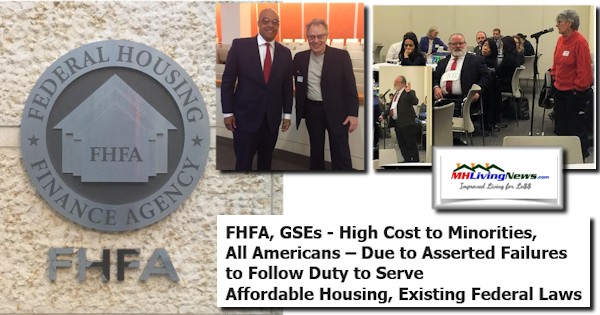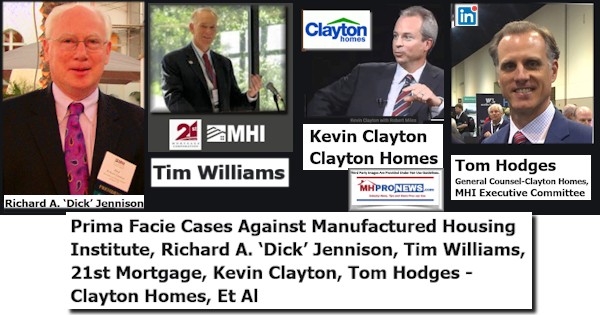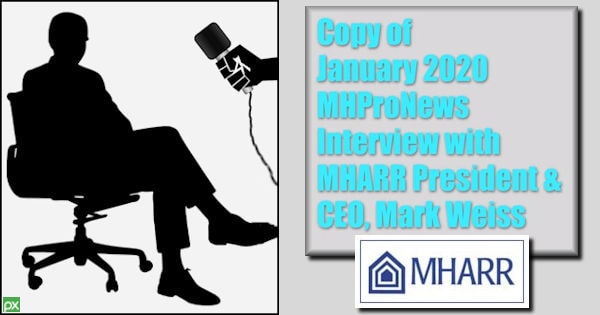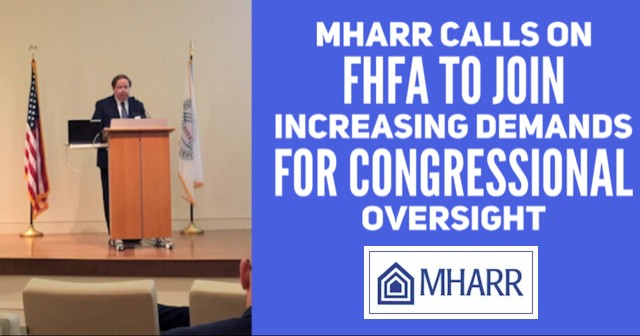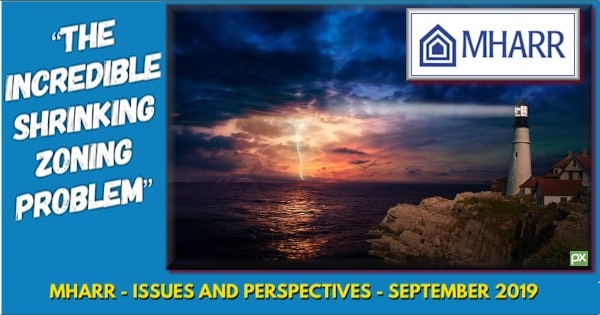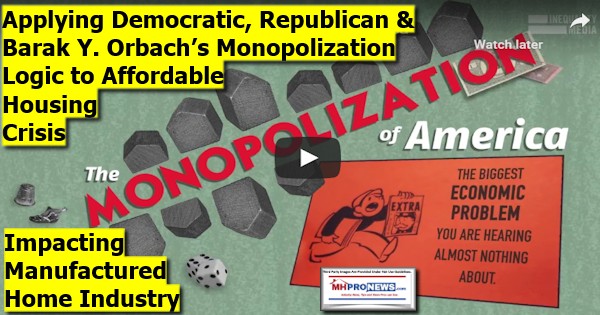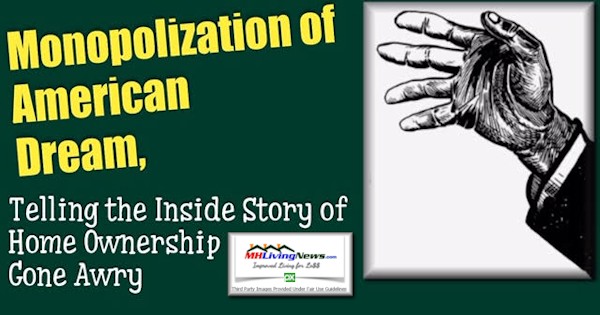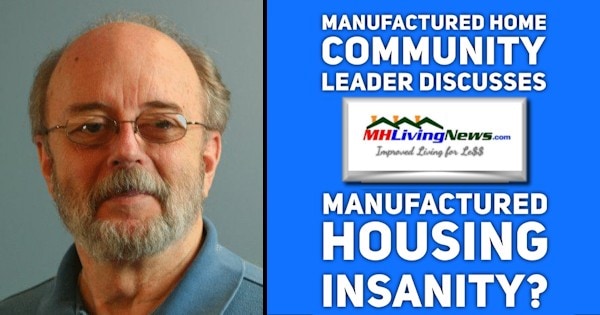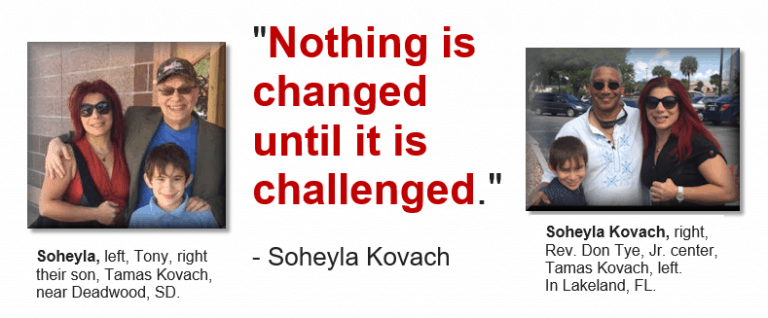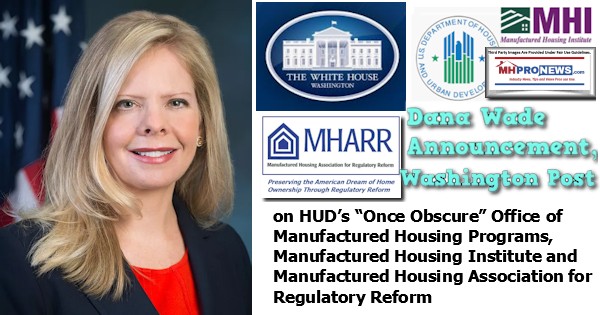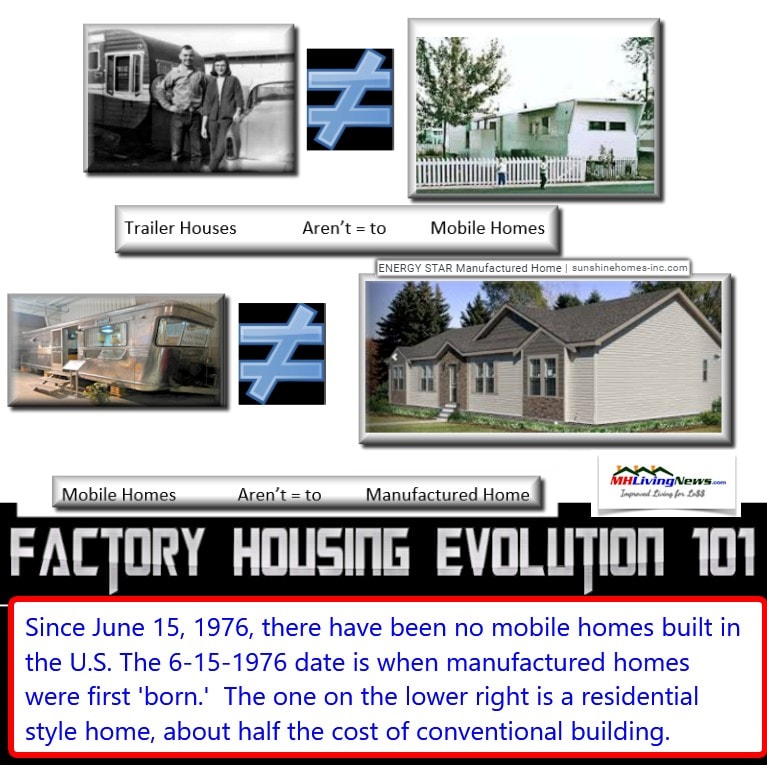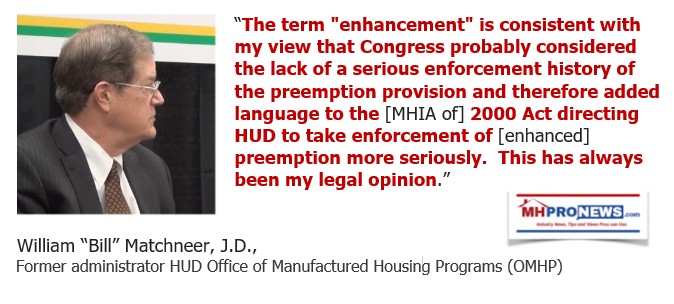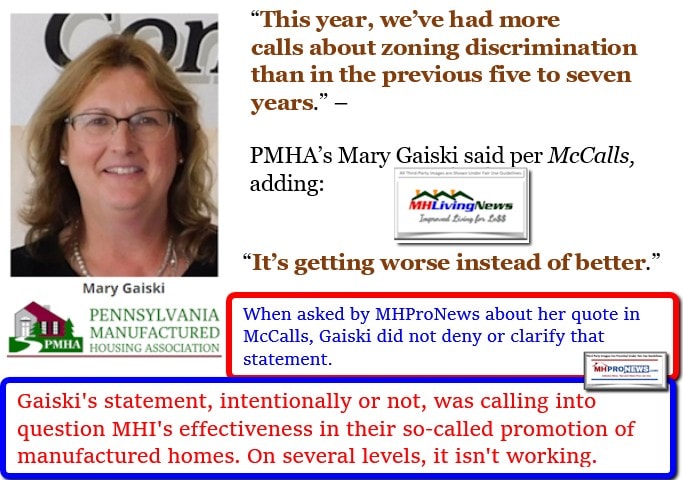In order to grasp the significance of the announcement by the Trump Administration that Dana Wade could be returning to the Department of Housing and Urban Development (HUD), it is useful for newer and longer-term readers alike to flash back to a previous report by the Washington Post on manufactured housing.
The pull quotes below are from the article by Juliet Eilperin entitled “A once obscure office at HUD is the subject of unusually intense lobbying effort.”
“The [association] efforts have come as [Trump] administration officials are embracing manufactured homes as a way to increase the stocks of affordable housing using the private sector rather than taxpayer funding,” wrote Eilperin, for the Washington Post (WaPo).
“Already, they [manufactured homes] serve as the largest source of unsubsidized affordable housing in America, with 22 million Americans living in structures ranging from trailers [*sic] to high-end homes with ample amenities,” Eilperin said in an article published on May 1, 2018. The Democratic Underground and others beyond MHProNews have referenced her report.
“Juliet Eilperin is The Washington Post’s senior national affairs correspondent, covering how the new administration is transforming a range of U.S. policies and the federal government itself,” reads her brief WaPo bio. “She is the author of two books — one on sharks and another on Congress, not to be confused with each other — and has worked for The Post since 1998.”
The Washington Postis owned by Jeff Bezos, the world’s richest man, according to Forbes and other sources. Billionaires Bezos, Warren Buffett, Michael Bloomberg and President Donald J. Trump have periodically sparred over issues that include antitrust concerns, gun rights, taxation, regulatory policies, and buying influence in Washington and at the state level too.
“For most of its existence, the Office of Manufactured Housing has been an unassuming office within a federal department not known for its glitz and glamour,” said Eilperin.
“But the little-known agency in the Department of Housing and Urban Development has been thrust into the spotlight as trade groups mount an unusually intense lobbying effort, seeking to scale back regulations that they say are hampering an industry that could provide a market-based solution to the affordable housing crisis,” said her insightful WaPo narrative.
“That the Trump Administration would be party to such an amazingly ill-considered, offensive and arguably scandalous action . . . is directly contrary to president trump’s own pledge to ‘drain the swamp’ in Washington D.C.,” wrote Mark Weiss, president of the Manufactured Housing Association for Regulatory Reform, in a July 27 letter [2017], which was unusually harsh even by Washington standards,” the narrative continued, revealing part of the backstory as to which association did what in the drama that took place at HUD that year.
“Within a few months [of MHARR’s complaints], Office of Manufactured Housing Programs Administrator Pamela Beck Danner had been reassigned, and the woman she had hired, Lois Starkey, had been terminated,” Eilperin stated.
By contrast, what did MHI reportedly say or do?
“Lesli Gooch, vice president of government affairs and chief lobbyist for the institute, said in an interview…[that] her association [the Manufactured Housing Institute, or MHI] did not weigh in on Danner’s reassignment, preferring to push for a broader reorganization.”
Note re: SIC * “trailers” has never been a proper term for a HUD Code manufactured homes, nor is “mobile home.”
There is more to that bit of history that WaPo usefully outlined, but that will follow further below. Let’s next cover an initial set of takeaways from the above, because seemingly coordinated misinformation is once more being thrust upon the industry by those associated with or who are known surrogates of MHI.
Initial Takeaways from the Washington Post MH Report
Eilperin arguably did thousands of manufactured housing industry professionals, and potentially millions of Americans, several significant favors through her tightly-written third-party narrative.
Among them? Eilperin confirmed the following:
- Lesli Gooch admits that MHI did not try to get Pam Danner removed from her destructive role as administrator over the HUD Code manufactured housing program office. Put multiple stars next to that revelation, and keep in mind that HUD Secretary Ben Carson called the way regulations had been handled “ridiculous.”
- Between the two national associations, the Manufactured Housing Association for Regulatory Reform (MHARR) was credited for their part in having Danner removed from her ‘leadership’ as the administrator of the HUD Code Manufactured Housing Program Office. MHI sat on their hands, choosing to posture so-called “broader reorganistion” instead of taking a direct stance.
- The above portion of the WaPo story confirmed years of reports by MHProNews. Specifically, that in spite of the call by numerous manufactured home industry pros, MHI’s own chief lobbyist – who is now the CEO of MHI – admitted to the mainstream media that they did not attempt to have Danner removed.
- Rephrasing, MHI was tacitly abetting Danner’s stay at HUD’s manufactured housing program office. Where was the logic in that for the majority of the manufactured housing industry? At that time, some 17 years of experience since the passage of the Manufactured Housing Improvement Act of 2000 should have made it clear that the administrator of the program can implement or foil the intent of the law. Did MHI staffers not know that history? Isn’t that self-evident logic, even absent a knowledge or that history?
- MHI was clearly going against the wishes of the majority of the independents of the industry, who wanted to see Danner’s regulatory overreaches stopped. See one of several examples of the desire for Danner’s removal in a report, linked here.
Additional Facts and Insights
What was unknown or unreported by Eilperin is this. Per federal sources, HUD’s Office of the Inspector General (OIG) was investigating Danner for possible inappropriate collusion with MHI. Hold that thought.
What role that HUD OIG probe played in the agency’s decision making process – which likely included Dana Wade’s input – on Danner’s removal from the OMHP is not entirely clear. But it is reasonable to think that between MHARR’s lobbying and a HUD OIG investigation that both pointed to problematic behavior by Danner, that those two factors played the role that the Washington Post’s narrative outlined. That resulted in Danner’s removal from OMHP, and eventual departure from HUD.
As a relevant related note Lois Starkey – also mentioned in the WaPo report – had previously been a vice president at MHI involved in regulatory details.
Starkey and then MHI president and CEO Richard “Dick” Jennison reportedly had friction between the two for some time. Starkey had by far the most institutional knowledge of the HUD Code program then. With her departure from MHI, years of institutional knowledge was lost. While MHI’s new President Mark Bowersox has had years of state level association experience, he lacked the same type of insights and experiences that Starkey had.
So, what remains at MHI at present? A largely new staff, featuring Gooch – who is already embroiled in several controversies, including the one above and the documented allegations of conflicts of interest with conventional housing organizations while she is supposedly working full time for manufactured housing. Gooch has not denied that the digitally signed documents are accurate and were signed by her, see the whistleblower report linked below and linked here.
Whistleblower’s Documents on Lesli Gooch – Manufactured Housing Institute CEO – New Discoveries
What has occurred in the face of these controversial problems? A flurry of counter-messaging from MHI and its apparent surrogates. But note that none of the counter-messaging directly disputes the evidence presented in the report above. Instead, it is another apparent case of ‘razzle dazzle,’ trying to use a red-herring method of distracting from authentic issues that plague the Arlington, VA based trade group.
“Here’s something to brighten up the last workday of the week,” wrote what sources say is MHI compensated surrogate, the flip-flopping ethically-controversial George F. Allen, in an email on 2.21.2020. “For the first time in decades (i.e. since 1991) we’re getting direct attention from the White House, relative to HUD-Code manufactured housing being factory-built housing’s answer to our nation’s affordable housing crisis!” First, that last part is clearly mistaken, as President Bill Clinton signed into law the Manufactured Housing Improvement Act (MHIA) of 2000. Additionally, the White House Council on Removing Barriers to Affordable Housing is another example of how Allen’s claim is factually wrong. Those who depend on Allen’s notion of ‘history’ are arguably being routinely misinformed.
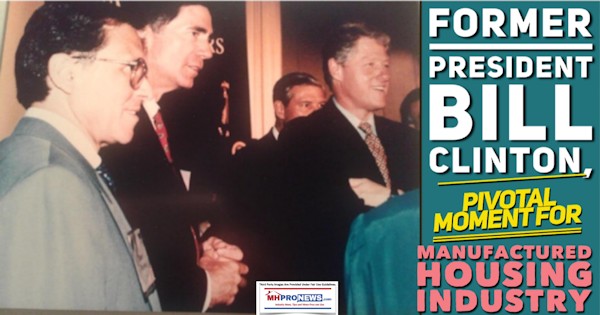
MHI surrogate Allen went on to praise MHI 2.0, Lesli Gooch – whose first name he routinely misspells by adding an ‘e’ – Mark Bowersox and himself. That missive by Allen continues a pattern of increased messaging recently by MHI and their apparent surrogates in the face of documented conflict of interest allegations and other concerns about their de facto working to consolidate the industry into ever fewer ‘big boy’ hands.
Note that while the Ohio Manufactured Home Association’s Tim Williams directly referenced what he errantly dubbed a “scorched earth” campaign aimed at MHI, neither Williams, MHI nor Allen actually addressed the evidence-based concerns. Williams has himself ironically cited the notable quote – “You are entitled to your own opinions, but you are not entitled to your own facts” by the late New York Senator Daniel Patrick Moynihan (D). Williams, who has years of political experience – and is himself said to be moonlighting as a ghostwriter – doubtlessly understands the red herring ploy of distracting attention without actually addressing a core issue or document and evidence-based allegations of malfeasance at MHI.
“Scorched Earth” Reply-Lesli Gooch, Tim Williams, and Manufactured Housing Institute (MHI) Claims
The Washington Post flashback is a reminder of that pattern of problematic behavior with respect to MHI posturing vs actually doing what they claim — namely, to represent “all segments” of manufactured housing. If so, why didn’t they act on Danner? Why is it that MHI’s actions and inactions – along with those of several key members – seem to routinely benefit consolidators and residents while harming white hat independents?
Which is an opportune segue to Dana Wade, who Eilperin identified as a Trump Administration appointee at HUD.
In written testimony to Congress in 2018, Wade said the following: “In accordance with the President’s Executive Orders on reducing regulatory burdens, in January 2018, HUD announced a top-to-bottom review of its manufactured housing policies. We invited the public to comment on policies and assess compliance costs of the program against the backdrop of HUD’s goal to facilitate affordable housing. The comment period closed on February 26, 2018, and we are currently reviewing the comments. We also plan to work with the MHCC to develop policies that ensure manufactured housing remains an accessible and affordable source of housing for millions of American families.”
Wade’s comments on manufactured housing to the House Committee on Appropriations Subcommittee on Transportation, Housing and Urban Development, and Related Agencies on April 25, 2018 begins on page 9 of the downloadable document linked here.
It is commonplace for trade associations to congratulate someone upon their appointment, and no doubt both national trade groups have done so with Wade. After all, they have to strive to get access to and work with that individual and their staff. It is the same reason that presidents make nice with world leaders, even if they may or may not like that person. It is the language of diplomacy.
But trade media doesn’t have to feel a similar constraint, as the role should be to shine a light that accurately depicts what is occurring, be it good, bad or indifferent. Wade’s role in the removal of Danner and implementing Trump Administration regulatory rollbacks is to be commended. But what must now be the focus is what will happen next given the ongoing problematic activities – and lack thereof – at HUD’s OMHP. The very things Wade said to Congress cited above should be the measure of her tenure.
Specifically, will Wade work for the full implementation of the Manufactured Housing Improvement Act (MHIA) of 2000? Why is a career administrator in charge of the program – Teresa Payne – when the law calls for a non-career administrator?
As or more serious is this. Why has Payne and others at HUD failed to step up to the plate when asked to engaged on local zoning issues where manufactured housing is being unjustly zoned out, partially or fully banned, as occurred in Bryan, Texas – and elsewhere?
It is useful for trade associations to act as potential watchdogs with bureaucrats, to see if they are doing what a given law calls on them to do. But Gooch herself admitted that she and MHI did not step in to ask for Danner’s removal. Recall that Danner was ‘parachuted into’ that OMHP role by MHI connected sources, even though MHI and MHARR had formally agreed to ask for Vic De Rose to fill that spot as a non-career administrator of HUD’s OMHP.
Put differently, with or without any association efforts, HUD officials should be following the law.

What this evidence-based review reminds readers old and new alike is this. MHI postures being a champion for manufactured housing, but is routinely engaged in behavior that benefits consolidators instead of consumers and the industry at large. By contrast, MHARR has acted consistently on behalf of the independent producers of HUD Code manufactured homes that they represent, which just happens to benefit consumers, plus independently owned retailers, communities, suppliers and other service providers. Furthermore, it is apparent that HUD has insiders that have failed to implement the regulatory plan that OMHP’s first administrator Bill Matchneer said was critical to the program’s effectiveness. Namely, “enhanced preemption.”
Here is how MHARR’s president put it to MHProNews.
The Arkansas Manufactured Housing Association (AMHA) Executive Director JD Harper put it this way in his recent comments letter on regulatory barriers requested by the White House.
MHI’s leadership, de facto surrogates Williams and Allen all declined comment on the latest round of fact-checks by MHProNews. The evidence and arguments being made thus stand unchallenged at this time. Indeed, facts produced by MHI’s own members – by accident or design – undercut MHI 2.0’s claims for momentum.
Legacy Housing Leadership Comments Undermine Manufactured Housing Institute Claims
While the Modular Home Builders Association (MHBA) continues to press MHI to drop their problematic terminology, they are striving to constructively build the market for their products. By contrast, while MHI postures, they fail to consistently press HUD and FHFA leadership to enforce existing laws that could address the affordable housing crisis.

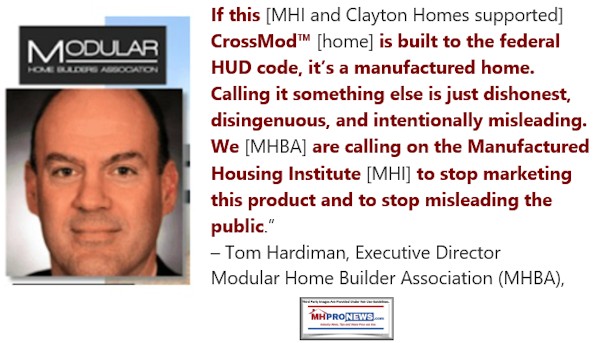
There is either inept or corrupt behavior that has been occurring in manufactured housing for some years.
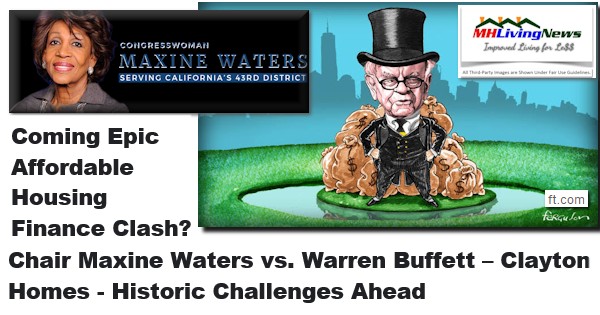
To go deeper on the growing track record of related issues that have arguably been keeping manufactured housing underperforming during an affordable housing crisis, see the timely reports further below. That’s a wrap on this report on manufactured housing “Industry News Tips and Views Pros Can Use“ © – MHVille’s runaway #1 news source, where “We Provide, You Decide.” © (News, fact-checks, analysis, and commentary.) Notice: all third party images or content are provided under fair use guidelines for media. 
Submitted by Soheyla Kovach for MHProNews.com. Soheyla is a co-founder and managing member of LifeStyle Factory Homes, LLC, the parent company to MHProNews, and MHLivingNews.com. Connect with us on LinkedIn here and here.
Manufactured Home Communities Targeted by Lawmakers, AG Plans – Manufactured Housing Industry Alert
No Title
No Description
No Title
No Description
No Title
No Description

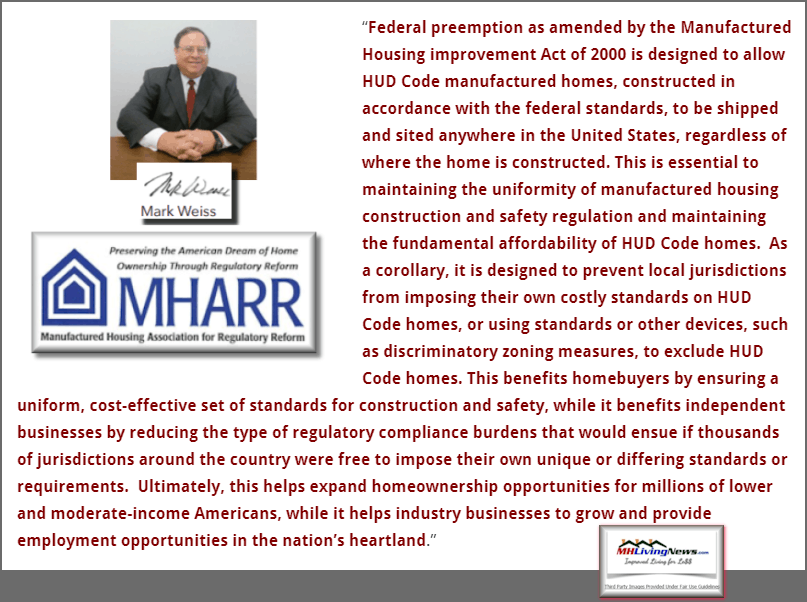
There is more than enough evidence that there is corruption, deceptive trade practices and other arguably illegal activities that are benefiting a few to the harm of the many. See the related articles below.
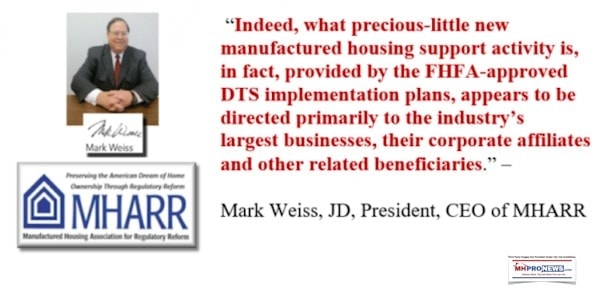
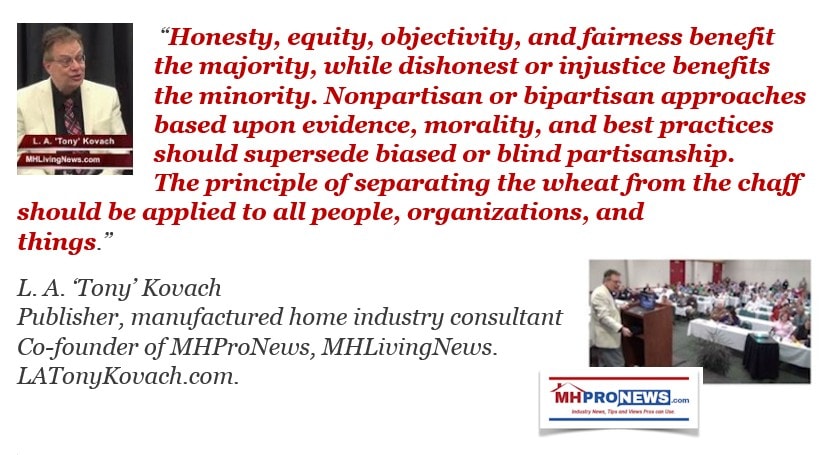
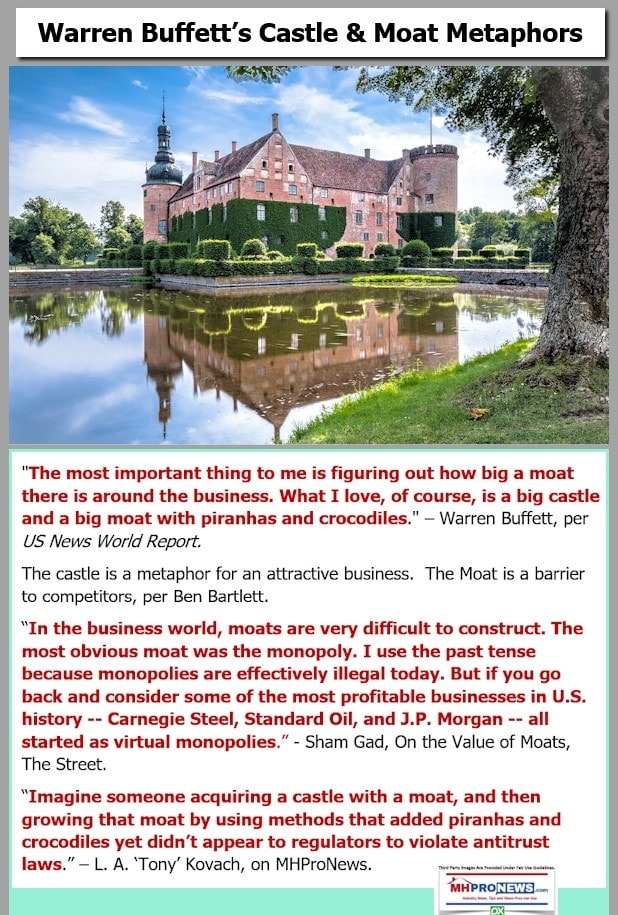
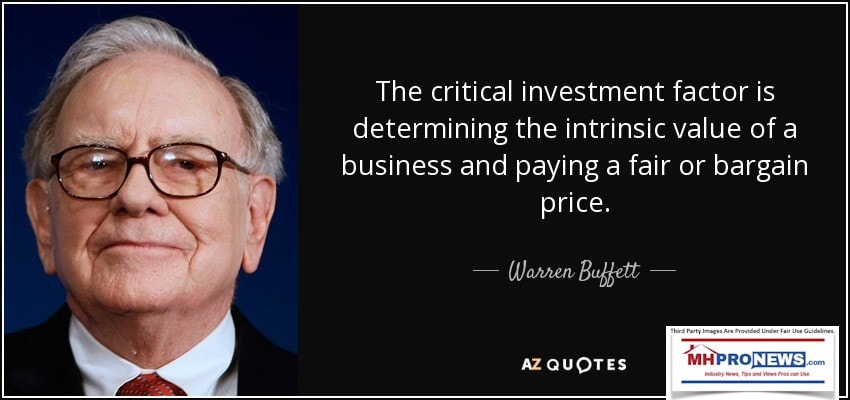
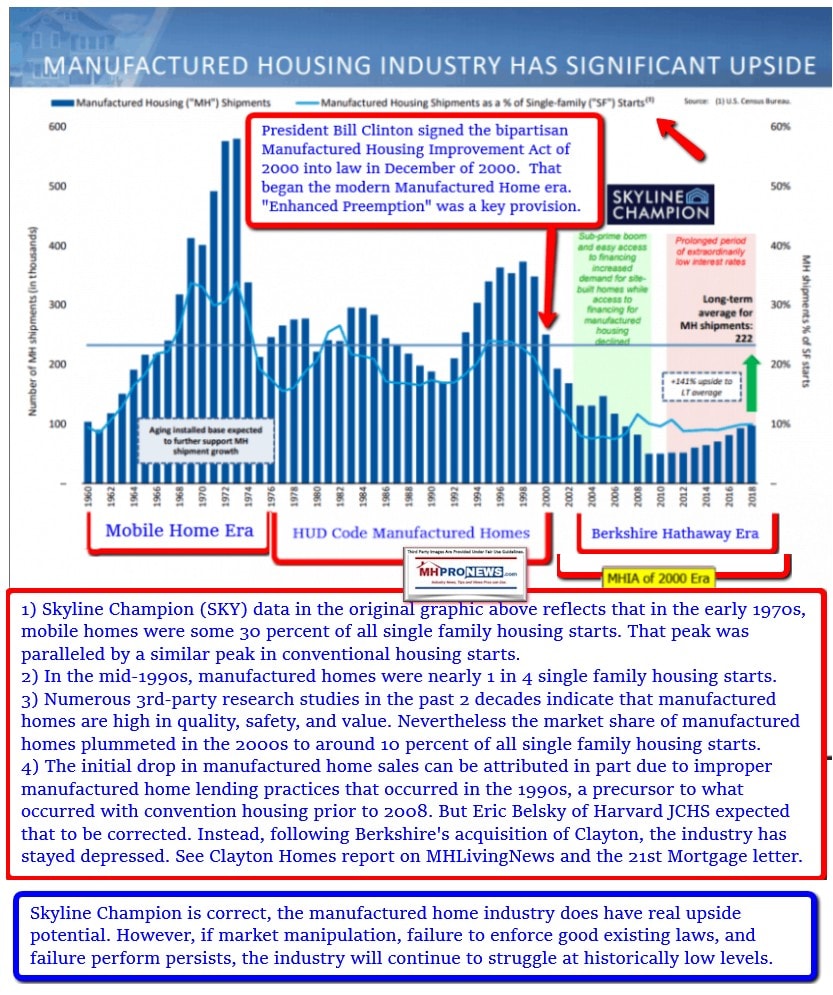
The bad news is that the opposition to ethical ‘white hat’ businesses, investors and other professionals have deep pockets and they are politically connected. But the good news is that Bernie Madoff could have once made that similar claim. Today, Madoff sits in a federal cell. It took persistence on the part of a few professionals with federal officials to finally topple Madoff’s multi-billion dollar empire.
